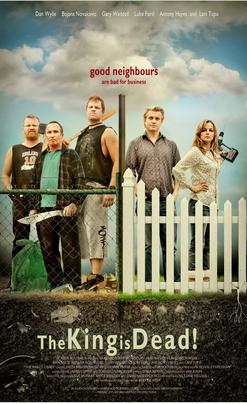
Jedda, released in the UK as Jedda the Uncivilised, is a 1955 Australian film written, produced and directed by Charles Chauvel. His last film, it is notable for being the first to star two Aboriginal actors, Robert Tudawali and Ngarla Kunoth in the leading roles. It was also the first Australian feature film to be shot in colour.

Docklands, is an inner-city suburb in Melbourne, Victoria, Australia on the western end of the central business district. Docklands had a population of 15,495 at the 2021 census.

Lygon Street is located in Melbourne, Victoria, Australia, running through the inner northern suburbs of Carlton, Carlton North, Princes Hill and Brunswick East. Lygon Street is synonymous with the Italian community of Melbourne, forming the nexus point of Little Italy. It is home to many Italian restaurants and alfresco cafés.

Brunswick is an inner-city suburb in Melbourne, Victoria, Australia, 5 km (3.1 mi) north of Melbourne's Central Business District, located within the City of Merri-bek local government area. Brunswick recorded a population of 24,896 at the 2021 census.

Brighton is a suburb in Melbourne, Victoria, Australia, 11 km south-east of Melbourne's Central Business District, located within the City of Bayside local government area. Brighton recorded a population of 23,252 at the 2021 census.

David James Stratton is an English-Australian film critic and historian. He has also worked as a journalist, interviewer, educator, television personality, and producer. His career as a film critic, writer, and educator in Australia spanned 57 years, until his retirement in December 2023.

Moonee Ponds railway station is a commuter railway station on the Craigieburn line, part of the Melbourne railway network. It serves the northern suburb of Moonee Ponds in Melbourne, Victoria, Australia. Moonee Ponds station is a ground level host station, featuring two side platforms. It opened on 1 November 1860, with the current station provided in 1882. It initially closed on 1 July 1864, then reopened in 9 October 1871.

HM Prison Pentridge, better known as Pentridge Prison, was an Australian prison established in 1851 in Coburg, Victoria. The first convicts arrived at the gaol in 1851. The facility closed on 1 May 1997, although some of the heritage-listed buildings still stand.

The Merri Creek Trail is a shared use path for cyclists and pedestrians that follows the Merri Creek through the northern suburbs of Melbourne, Australia.

Melbourne tram route 16 is a tram route on the Melbourne tramway network serving the city of Melbourne in Victoria, Australia. Operated by Yarra Trams, the route is coloured light yellow and extends from Melbourne University to Kew over 20.2 kilometre of double track via Swanston Street, St Kilda Road, Fitzroy Street, The Esplanade, Balaclava Road and Glenferrie Road. It is serviced out of Malvern depot utilising Z and D1 class trams.

Charles Edward Chauvel OBE was an Australian filmmaker, producer, actor and screenwriter and nephew of Australian army General Sir Harry Chauvel. He is noted for writing and directing the films Forty Thousand Horsemen in 1940 and Jedda in 1955. His wife, Elsa Chauvel, was a frequent collaborator on his filmmaking projects.

Melbourne is the capital and most populous city of the Australian state of Victoria, and the second-most populous city in Australia, after Sydney. The city's name generally refers to a 9,993 km2 (3,858 sq mi) metropolitan area also known as Greater Melbourne, comprising an urban agglomeration of 31 local government areas. The name is also used to specifically refer to the local government area named City of Melbourne, whose area is centred on the Melbourne central business district and some immediate surrounds.
L'Alliance Française French Film Festival is an annual French film festival in Australia organised by Alliance Française.
Sons of Matthew is a 1949 Australian film directed and produced and co-written by Charles Chauvel. The film was shot in 1947 on location in Queensland, Australia, and the studio sequences in Sydney. Sons of Matthew took 18 months to complete, but it was a great success with Australian audiences when it finally opened in December 1949.

Luna Leederville is a cinema complex located at the corner of Oxford and Vincent streets in Leederville, a suburb of Perth, Western Australia.

The King Is Dead! is a 2012 Australian comedy drama thriller film directed by Rolf de Heer about a young couple who are tormented by the neighbour from hell.

East Bourke Boroughs was an electoral district of the Legislative Assembly in the Australian state of Victoria from 1859 to 1904.

Dendy Cinema Pty Limited is an Australian cinema chain. As of 2025 it operates multiplex cinemas in Sydney, Canberra, the Gold Coast, and Brisbane. The company is a subsidiary of the Dendy Icon Group, which also owns Icon Productions, Icon Film Distribution, and Icon Film Finance.

The Melbourne Queer Film Festival (MQFF) is an annual LGBT film festival held in Melbourne, Victoria, Australia in November. Founded in 1991, it is the largest queer film event in the Southern Hemisphere, in 2015 attracting around 23,000 attendees at key locations around Melbourne.

Sylvia Lawson was a journalist, academic and author, known for her support for cinema in Australia through her work with the Sydney Film Festival from its inception in 1954. She wrote The Archibald Paradox, a study of The Bulletin and its founder, J. F. Archibald.
























